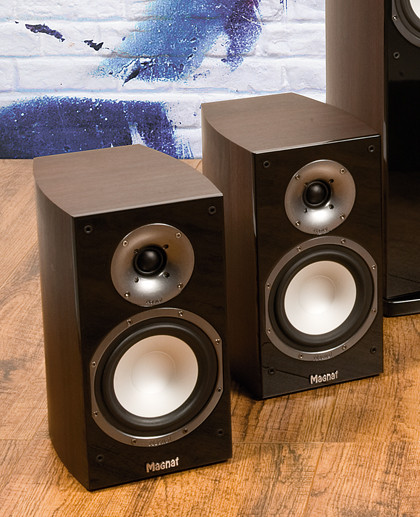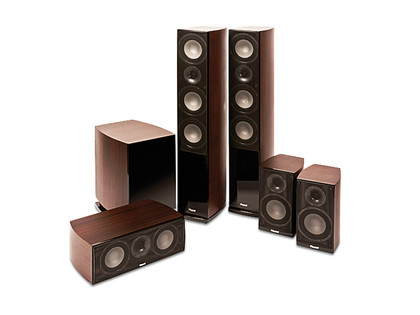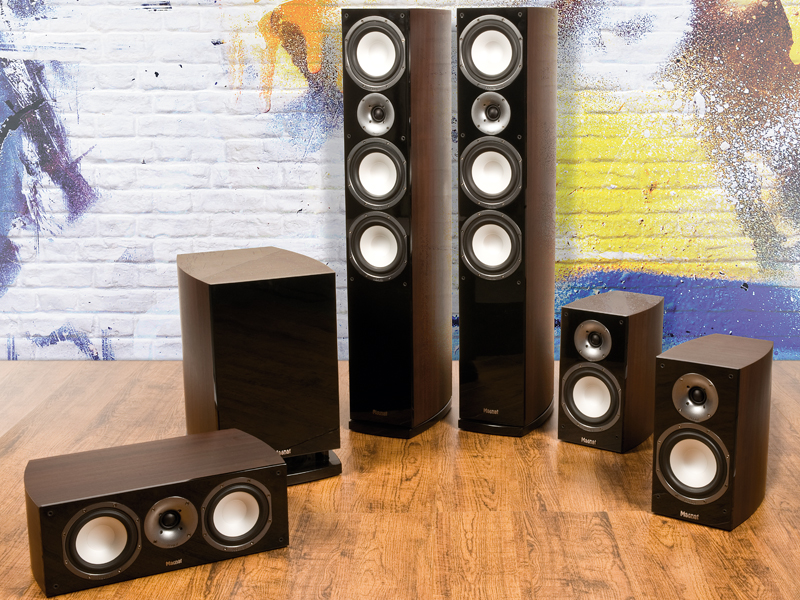TechRadar Verdict
Pros
- +
Delicious clarity and articulacy at sensible levels
- +
Value for money
- +
Sturdy cabinets
Cons
- -
Low-frequency performance is lacking
- -
Uninspired design
Why you can trust TechRadar
Branding is funny stuff. We expect some gravitas with excellent products – being too flippant about something of high-quality tends to put us Brits right off. There's been a huge fuss about chavs wearing Burberry and 'devaluing' the brand, for instance.
Not so the Germans. The Quantum 650 Series speakers are made in Germany by in-car brand, Magnat, which has never seen fit to change its cartoony logo font. Even on its £25K-a-pair flagship home cinema speaker.
Yet don't be put off by that comedy typeface; Magnat knows its onions, and the brand's home cinema stable has long since gone off on its own development curve, offering some tremendous technology for the price.

Reviewed here is the Quantum 650 series – big brothers to Magnat's Quantum 550 and 600s, yet junior to the top-end Quantum 1000 set. They're distributed in the UK by BGAudio Ltd, which can be reached on 01923 853211.
Classic lineup
The tested speaker array is simple and classical in design. The Quantum 657 front towers are dual-ported to the back, with big open-mouthed curvy ports which Magnat calls Airflex.
One of the bigger drivers is coupled up to the tweeter as a mid-bass driver, while the other two drivers of the same size are used for bass. You get a bi-wire/biamp set of posts to the rear – and if you do divide up the speaker with two wires, removing the supplied jumpers, a passive crossover inside will sort out the 'hoch' from the 'mitt'.
The 653 bookshelves, used as rears, have just the equivalent of the upper section of the 657s – the midand high- driver – and the 63 centre uses a brace of midbasses in a smaller 5.25-inch size straddling the same tweeter used all round.
The latter is a sexy piece of kit for such a low-price set of speakers. It has Ferrofluid in its voice coil gap and uses a fabric dome. Soft fabric domes generally sound nicer than harder ones (unless they are costly examples, or made of Diamond – which is the same thing, I suppose), while the magnetic 'liquid-Iron' stays solidly in the gap in the magnet, serving to rapidly conduct heat away from the coil.
It won't squeeze up and heat up like air does, compressing in the gap. All this technical cleverness adds up to a tweeter that can go louder for longer, be less stressed and better-sounding with low power compression. This is normal on more expensive speakers, but not what you necessarily expect to see at this level.
The 625A subwoofer stands on feet above its own plinth. This is good as it means the maker understands bass and hasn't just boxed up a driver with an off-the-shelf amp plate from a factory. Magnat has fired the driver down onto a solid wooden platform, so it has to squeeze out of the surrounding gap at the bottom. Done right, this is like compressing explosives for better results, and makes the two gas-flowed rear ports really breathe some lows out.
Alien resurrection

After finally downloading my Father's Day gift, sci-fi comedy Paul, to my iPod (I adore the Triple-Play disc concept, but wish Apple would speed up...), it was time to run the traditional Blu-ray platter through these floorstanders.
Setting the subwoofer is dead easy. You just get a 50Hz-150Hz sweepable crossover knob, a gain knob and a regular 0-180˚ phase flipper switch. This is always worth a go. If one way sounds better, then it's correct in that phase, in that spot, in your room. It's really that simple.
Connections are a high-level stereo speaker input set of binding posts and a single LFE phono input. The eponymous star of the film is an alien who crashed in Roswell in New Mexico in 1947 and has been trying to escape ever since. The movie opens in '47, when we learn how the character got his name while experiencing the UFO crash. And sadly, we find the limit of this 5.1 system immediately. The subwoofer.
While the Magnat 625A Quantum has 275W of power, it's not enough for a crashing spaceship when the rest of this array is winging it in over your head. Despite there being some hint of a limiting circuit in the multi-language manual, the sub simply ran out of grunt and farted. I turned it down significantly and to be fair, as my son carried on watching the rest of the movie (which I actually went to the flicks to see, despite the cheap projectors) the house was gently rumbling along.
But for this system, I would want a brace of these woofers in my room. These speakers are deeply articulate and are very good at sensible levels. With a sweet textured detail to the upper mids and highs, the clever tweeters also get some acoustic benefit from living in little stubby horns.
Unfortunately, the sound can become a bit hard and brittle if you drive them over-enthusiastically, but again, for the sub-£2K price tag, you can't expect perfect detail and limitless power.
So, the Magnats' scale and might departments are lacking compared to a big system that has a driver with a high surface area. But at all other times, you will get a really well-placed soundstage, with horribly difficult instruments to reproduce, such as closely mic-ed plucked guitars and pianos, all sounding delicious, sweet and accurate.
This deft touch is well shown off as the two geeks (Simon Pegg and Nick Frost) meet Paul for the first time. He looms out of the darkness slowly and we hear his voice, quietly spoken, before we see him. You can almost hear the space around them in the Nevada desert night.
Overall, these are a really serious proposition if fidelity matters most and they fit your budget. The array sounds great with music, too, and the sub's shortcomings are less apparent on films without explosions. Which, I've been told, do exist…
Follow TechRadar Reviews on Twitter: http://twitter.com/techradarreview
